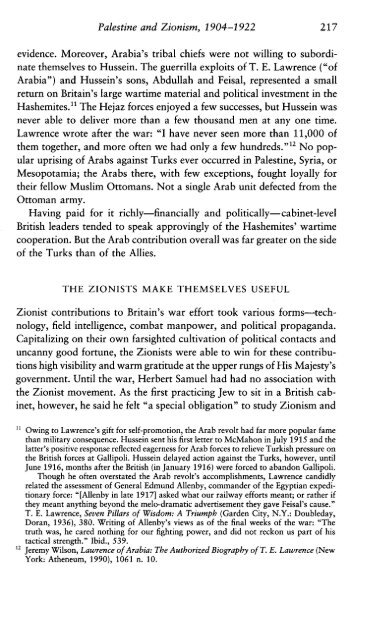Churchill, Palestine and Zionism, 1904-1922 - Douglas J. Feith
Churchill, Palestine and Zionism, 1904-1922 - Douglas J. Feith
Churchill, Palestine and Zionism, 1904-1922 - Douglas J. Feith
Create successful ePaper yourself
Turn your PDF publications into a flip-book with our unique Google optimized e-Paper software.
<strong>Palestine</strong> <strong>and</strong> <strong>Zionism</strong>, <strong>1904</strong>-<strong>1922</strong> 217<br />
evidence. Moreover, Arabia's tribal chiefs were not willing to subordinate<br />
themselves to Hussein. The guerrilla exploits of T. E. Lawrence ("of<br />
Arabia") <strong>and</strong> Hussein's sons, Abdullah <strong>and</strong> Feisal, represented a small<br />
return on Britain's large wartime material <strong>and</strong> political investment in the<br />
HashemitesY The Hejaz forces enjoyed a few successes, but Hussein was<br />
never able to deliver more than a few thous<strong>and</strong> men at anyone time.<br />
Lawrence wrote after the war: "I have never seen more than 11,000 of<br />
them together, <strong>and</strong> more often we had only a few hundreds."12 No popular<br />
uprising of Arabs against Turks ever occurred in <strong>Palestine</strong>, Syria, or<br />
Mesopotamia; the Arabs there, with few exceptions, fought loyally for<br />
their fellow Muslim Ottomans. Not a single Arab unit defected from the<br />
Ottoman army.<br />
Having paid for it richly-financially <strong>and</strong> politically-cabinet-Ievel<br />
British leaders tended to speak approvingly of the Hashemites' wartime<br />
cooperation. But the Arab contribution overall was far greater on the side<br />
of the Turks than of the Allies.<br />
THE ZIONISTS MAKE THEMSELVES USEFUL<br />
Zionist contributions to Britain's war effort took various forms-technology,<br />
field intelligence, combat manpower, <strong>and</strong> political propag<strong>and</strong>a.<br />
Capitalizing on their own farsighted cultivation of political contacts <strong>and</strong><br />
uncanny good fortune, the Zionists were able to win for these contributions<br />
high visibility <strong>and</strong> warm gratitude at the upper rungs of His Majesty's<br />
government. Until the war, Herbert Samuel had had no association with<br />
the Zionist movement. As the first practicing Jew to sit in a British cabinet,<br />
however, he said he felt "a special obligation" to study <strong>Zionism</strong> <strong>and</strong><br />
11 Owing to Lawrence's gift for self-promotion, the Arab revolt had far more popular fame<br />
than military consequence. Hussein sent his first letter to McMahon in July 1915 <strong>and</strong> the<br />
latter's positive response reflected eagerness for Arab forces to relieve Turkish pressure on<br />
the British forces at Gallipoli. Hussein delayed action against the Turks, however, until<br />
June 1916, months after the British (in January 1916) were forced to ab<strong>and</strong>on Gallipoli.<br />
Though he often overstated the Arab revolt's accomplishments, Lawrence c<strong>and</strong>idly<br />
related the assessment of General Edmund Allenby, comm<strong>and</strong>er of the Egyptian expeditionary<br />
force: "[Allenby in late 1917] asked what our railway efforts meant; or rather if<br />
they meant anything beyond the melo-dramatic advertisement they gave Feisal's cause."<br />
T. E. Lawrence, Seven Pillars of Wisdom: A Triumph (Garden City, N.Y.: Doubleday,<br />
Doran, 1936), 380. Writing of Allenby's views as of the final weeks of the war: "The<br />
truth was, he cared nothing for our fighting power, <strong>and</strong> did not reckon us part of his<br />
tactical strength." Ibid., 539.<br />
12 Jeremy Wilson, Lawrence of Arabia: The Authorized Biography ofT. E. Lawrence (New<br />
York: Atheneum, 1990), 1061 n. 10.


